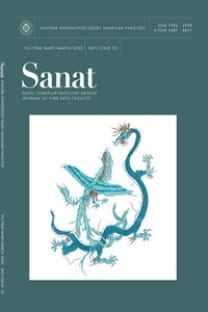SHAKESPEARE’İN OLAY ÖRGÜSÜ VE KOMEDİDEKİ USTALIĞI: YOK YERE YAYGARA
Shakespeare, Yok Yere Yaygara, Yeni Komedi, Shakespeare Komedisi
SHAKESPEARE’S MASTERY OF PLOT AND COMEDY IN MUCH ADO ABOUT NOTHING
Shakespeare, Much Ado About Something, New Comedy, Shakespearean Comedy,
___
- Abrams, M. H. and Harpham G. G. A Glossary of Literary Terms. Ninth Edition. Boston: Wadsworth Cengage Learning, 2009.
- Boyce, C. The Wordsworth Dictionary of Shakespeare. Hertfordshire: Wordsworth Editions Ltd., 1996.
- Danson, L. Shakespeare’s Dramatic Genres. New York: Oxford Univ. Press, 2000.
- Garber, M. Shakespeare After All. New York: Anchor Books, 2004.
- Leggatt, A. Shakespeare’s Comedy of Love. London and New York: Methuen, 1987.
- Miola, R. S. Shakespeare and Classical Comedy. Oxford: Clarendon Press, 1994.
- Riehle, W. Shakespeare, Plautus and the Humanist Tradition. Cambridge: Brewer, 1990.
- Shakespeare, W. Much Ado About Nothing. (Edited by Claire McEachern). London: Arden Shakespeare, 2006.
- Wolfensperger, P. Shakespeare: Impartial and Partial. Tübingen: Verlag, 1994.
- ISSN: 1302-2938
- Başlangıç: 2020
- Yayıncı: Atatürk Üniversitesi
BİR MANZARA PERFORMANSÇISININ PORTRESİ: NİKHİL CHOPRA
YÜZ YÜZE VE UZAKTAN EĞİTİM İLE VERİLEN GRAFİK TASARIM PROJE DERSLERİNİN DEĞERLENDİRİLMESİ
OSMANLI DÖNEMİ İNSAN FİGÜRLÜ ÇİNİ TASVİRLERİNDE BAŞ SÜSLEMELERİ
Eda DEMİR TOSUNOĞLU, Olcay BORATAV
SANAT EĞİTİMİNDE FELDMAN'IN SANAT ELEŞTİRİSİ YÖNTEMİNE DAYALI ÖNERİLEN BİR PROGRAMIN ETKİSİ
Mowafaq ALSAGGAR, Taiesir TUBAISHAT
GOYA’NIN KARA RESİMLERİ VE "KÖPEK" ADLI RESMİNİN ANALİZİ
ŞEMSE İKONOGRAFİSİ İÇİN BİR ÖNERİ
Alper SAĞLIK, Merve TEMİZ, Gizem KASNİÇ, Abdullah KELKİT
SALVADOR DALİ’NİN KANAYAN GÜLLERİ
GÜNÜMÜZ SANATINDA DEĞİŞEN GALERİ ORTAMI BAĞLAMINDA MEKAN-DOĞA ETKİLEŞİMİ
